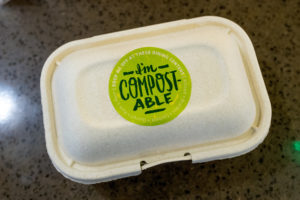On a rainy, cold and windy Tuesday in Fort Collins last month, Maggie Gilman and Albert Cones braved the elements to compost food waste on Colorado State University’s Foothills campus.
The composting system nicknamed Oscar — because he can be a grouch, and sometimes breaks down — was grinding up food waste while Gilman, a sophomore in the Department of Human Dimensions of Natural Resources, looked at more than 300 pounds of food waste she’d just dumped into the machine.
“There’s some chicken, noodles, salad, and rice,” she said, describing the colorful food waste from residence hall dining centers.
Cones, a technician with Facilities Management, had just constructed CSU’s first windrow, a long row of almost 1,500 pounds of pulped food waste, hay and horse manure. He could not contain his excitement in describing the new composting process.
“We are giving back to the land,” Cones said. “That’s what we’re excited about, on a large scale, to get food waste on campus out here and to recycle it.”
Process saves money, helps the environment
The U.S. Department of Agriculture estimates that up to 40 percent of the food supply in the country ends up as waste. In landfills, food waste also generates methane, a greenhouse gas, so diverting that waste to compost is good for the environment.
Compost giveaway for Earth Week
Bring your own buckets! CSU employees and students can pick up two 5-gallon buckets of compost as part of Earth Week festivities Tuesday, April 18, 11 a.m.-1 p.m. Please note a new location this year: Parking Lot 740, located off Research Boulevard on the south campus.
Got e-waste? You can also drop off up to two household electronics for e-waste recycling free of charge at the same time and location. No commercial grade or oversize electronics, appliances, or televisions over 24 inches can be accepted.
Expanding compost efforts on campus will cost money in the short term, but the program is designed to be self-sustaining, eventually, by selling the end product.
Facilities Management and Housing & Dining Services already provide compost for CSU’s greenhouses and donate to The Growing Project, a nonprofit that creates community gardens to increase the supply of fresh local produce.
With the new windrows, CSU will repurpose nearly 5,000 pounds of food waste from residence hall dining centers every week. This pulped waste had previously been diverted to the Fort Collins wastewater treatment facility, said Sheela Backen, operations manager in Facilities Management.
Finished compost will be created in the new windrows in two months, which is similar to the time it takes to compost materials using Oscar, formally known as an anaerobic digester.
CSU joins Arizona State and Kansas State universities in using windrows for composting. Backen said the CSU program will soon expand beyond dining halls into academic buildings.
“We will offer paper towel composting from restrooms, and food waste composting for break rooms,” she said.
Pilot project with campus restaurants
 Facilities Management teamed up earlier this year with Addy Elliott, instructor in the Department of Soil and Crop Sciences, and her students to oversee a two-day compost pilot project with Lory Student Center-managed restaurants, LCS catering and coffee shops in the LSC, Behavioral Sciences Building and Morgan Library. The project targeted “back-of-the-house” composting, which means food waste from kitchen, restaurant and catering preparation.
Facilities Management teamed up earlier this year with Addy Elliott, instructor in the Department of Soil and Crop Sciences, and her students to oversee a two-day compost pilot project with Lory Student Center-managed restaurants, LCS catering and coffee shops in the LSC, Behavioral Sciences Building and Morgan Library. The project targeted “back-of-the-house” composting, which means food waste from kitchen, restaurant and catering preparation.
Employees at That’s a Wrap and the LSC Grab and Go were so enthusiastic about the project, they decided to continue to compost food waste beyond the planned timeframe. The program will officially expand July 1 and will include all CSU-managed restaurants, including the Bagel Place and the Ramskeller in the LSC.
Gilman said what’s she learned on the job has been a great supplement to classroom learning. It’s also helped her become more connected with like-minded students, researchers and staff.
“I’m working with a team that wants to help more restaurants divert food waste, and wants to connect all the dots, and get students involved to help divert waste at places including the new stadium,” she said. “I don’t study hard science, but I’ve been able to learn through experience out here. Ultimately that’s the best way for me to learn.”
Student involvement leads to compost change
Clayton King, who graduated from CSU in 2016, led the charge for the new windrows. He was serving as the ASCSU director of Governmental Affairs, and suggested that Facilities Management submit a proposal to the University Facility Fee Advisory Board to expand campus composting operations. Thanks to King’s vision, CSU will divert 11,250 cubic yards of animal waste, 300 cubic yards of plant material and 8,000 cubic yards of paper towel waste each year from the landfill.
See related Earth Week Stories in SOURCE
Repeat performance: CSU earns second STARS Platinum rating for sustainability
Get your Earth Week on April 17-26
Just chill: Freezer rebate program contributes to sustainability efforts
Trash or recycling? What you need to know